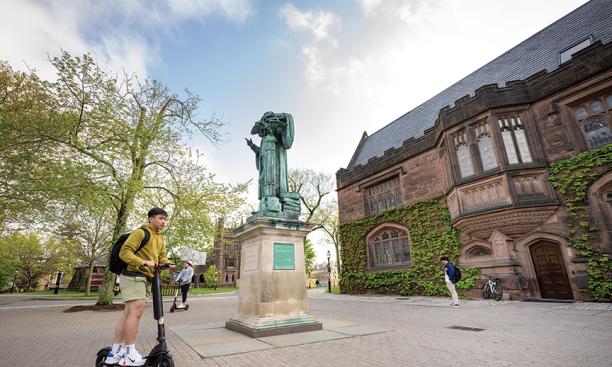
A cross-departmental group at the University is working to improve the safety and convenience of transportation on campus for both pedestrians and those using personal mobility vehicles such as bicycles, electric scooters, and electric skateboards. A mobility safety campaign in April and May used social media to try to raise awareness of existing rules and guidelines, including a Personal Electric Vehicle policy that went into effect shortly before COVID.
“There will always be new and evolving ways of moving around campus, but regardless of the mode we choose, we should always be moving safely and courteously,” said Charlie Tennyson, director of Transportation & Parking Services. “The campaign is about building new cultural norms on campus that include these new devices … while preserving the pedestrian experience.”
A series of seven short “Tiger Reacts” videos used Princeton’s mascot to deliver messages such as “take it slow,” “keep entryways clear,” and “don’t scroll and roll.” You can watch the first video and read Princeton’s mobility safety rules on the Transportation & Parking Services website.
Mechanical and aerospace engineering major Ritvik Agnihotri ’22, who builds electric scooters in his free time, estimates that about 40 percent of students have e-scooters. When he rides his around campus, he’s sure to be careful, particularly on busier roads such as Washington. Agnihotri, who also loves to make music, has spent so much time waiting at the intersection of Washington and Nassau that it inspired him to sample the crosswalk voice in a trap beat song, which you can listen to on his SoundCloud.
SPIA major Naomi Hess ’22, who uses a wheelchair to navigate campus, would like to see mobility improvements. “There have been many times when I’ve not been able to get to the automatic door button [due to improper device parking], which presents a problem for me,” she said. In addition, she’s encountered e-scooter riders “who could be a little more careful with their speed and their turns.”
While e-scooter user Jasman Singh ’23, a SPIA major, doesn’t think the devices are inherently dangerous, he agrees that, “as you try and scale up without surrounding infrastructure like bike lanes, bike racks, space on walking paths, etc., you’ll run into problems of safety.”
The safety campaign is part of a larger effort that also includes a comprehensive study of campus paths and streets, device parking facilities, signage, and maintaining safe and accessible corridors throughout construction.
The University recently purchased approximately 120 bikes formerly owned by bikeshare partner Zagster, which went out of business, and is now renting them out to students and piloting a departmental program in which multiple staff members have access to one bike.
